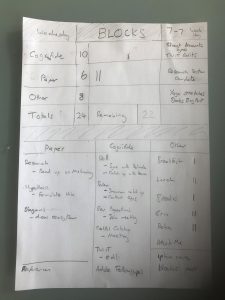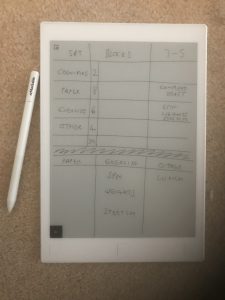I’m always looking for ways to be more productive. Always. With so many things to get done, I’ve been a long time subscriber to the getting things done philosophy. Over the last couple of years, I’ve been toying with a block system to better structure my work day. Last week, I put block days to work.
The Block
A block is a period of time. Blocks come in various sizes. 30-minute blocks. 20-minute blocks. One hour blocks. You decide.
The goal is to break up your work day into blocks. Then decide what you want to do in each block. That’s it. The theory is simple, but the execution is a little harder.
 Time for an example. When I get up and decide its a block day, the first I do is grab a sheet of paper and block out the day. At the top, you see it’s Wednesday and my day runs from 7am to 7pm. I tend to use 30-minute blocks giving me 24 blocks in total to play with.
Time for an example. When I get up and decide its a block day, the first I do is grab a sheet of paper and block out the day. At the top, you see it’s Wednesday and my day runs from 7am to 7pm. I tend to use 30-minute blocks giving me 24 blocks in total to play with.
I work at Cognifide. I’ve assigned 10 blocks (5 hours) to Cognifide, a paper I’m writing has 6 blocks (3 hours) and other stuff I need to do in the day makes up the remaining 8 blocks (4 hours). I capture high-level outputs/outcomes for each of these block areas. For example, I want to complete the research section of a paper I’m writing today using the allocated 6 blocks. When I’m planning the block day, I make I’ll be happy with the outcomes/outputs. Then the day is around doing the activities in the blocks to hit those goals.
When I first started blocking out my day I got too fine grained. I had lots of block areas on the left, typically 2-4 blocks, but that didn’t work. So I got more coarse-grained in my planning. I introduced the bottom section to illustrate the activities I’d perform within each block area. This worked well. I tend to add and remove actions in this bottom section as I progress through the day. Always use pencils, and have an eraser nearby.
Finally, as you progress through your block day, mark the blocks off. This is so important. You are rewarding the progress you’re making. Marking off blocks is a great feeling and pushes you towards the end.
Block Days
Not every day is a block day. For me, when I have control over the day, I block it out. But calendars,  meetings, client commitments, conferences, travel, and so on, render certain days unblockable.
meetings, client commitments, conferences, travel, and so on, render certain days unblockable.
Respect the blocks. Keep to them. They drive your day. Combine them when it makes sense. Leave them when they don’t. I’ve never split blocks. I combine blocks when I find myself in the moment and I need to just get the task done. That’s why I favour 30-minute blocks because I can stretch to an hour. However, I never combine 3 blocks. 90 minutes is just too much work for one block sitting.
A 12 hour block day is intensive. I allocate a third of day as non-work blocks (8 blocks) on long block days. That’s basically, two blocks on, one block off. That’s still an intensive day but doable.
Blocks allow you to see your day. I mean, really, see your day. Nothing is left to chance. You could have a block area for Travel. If you do, build that into your day but also put an output against it such as listen to a podcast, call family, check in with friends, watch a video, whatever. Just because you’re travelling doesn’t mean you can’t be “getting things done”. Plan for it.
Be disciplined. Start and end your blocks on time. Keep to the activity in your block. Don’t stray. Don’t break protocol. The temptation is high. Just resist. If you finish your block activity early, take stock of where you are and re-plan. I’ve actually found myself keeping to 25 minutes within my block and using the last 5 minutes to prepare to switch to the next block and/or re-plan. The only exception to this rule is if my next block is a non-working block.
At the end of your block day, check your outputs/outcomes. Did achieve everything you set out to do?
Next ‘Block’ Step
I plan to create a template for my block day. This shouldn’t be too hard to do. I already have a version in my remarkable. I just to need to tidy it up.
In times of high workload, I need more block days. I proactively organise my calendar to create more candidate block days. As a rough estimate, I’m 25% more productive on block days than non-block days. Why? Because prior planning prevents piss poor performance. Block days are a damned straightforward planning tool.
On a final note, do whatever you want either side of your block day. For me, I can’t do anything sensible after 7pm on a block day. Celebrate your achievements. Don’t overdo things. Start and end your block day on high!
Let me know what you think!


Pingback: Separate Work from Home - Cleve Gibbon
Pingback: Slow Productivity - Cleve Gibbon